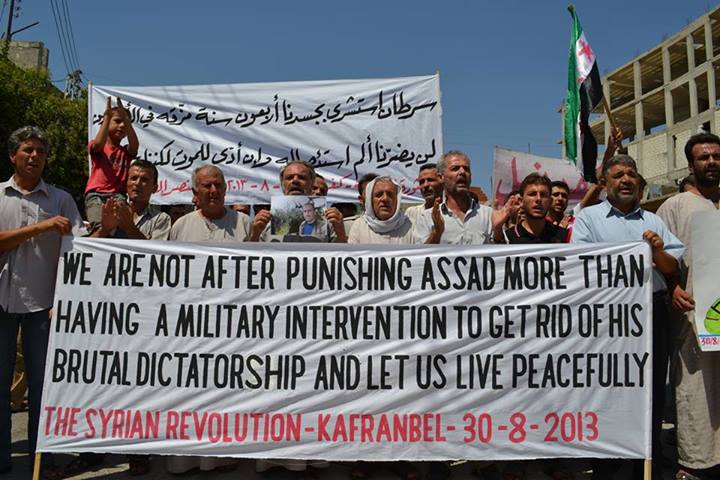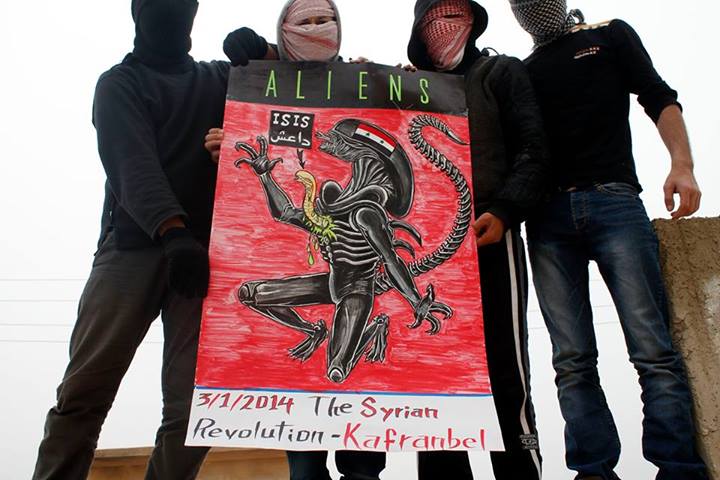The town of Kafranbel in Idlib Province has become an icon of protest in Syria’s conflict, challenging not only the Assad regime but also the international community over its inaction and factions like the Islamic State of Iraq and as-Sham for their violence and abuse.
Raed Fares, who runs the Kafranbel Media Center, and leading Syrian blogger Razan Ghazzawi spoke last week with The New York Times about protest and defiance:
Q. Can you tell us a little bit about the situation on the ground in Kafranbel?
Fares: There are still shelling and rocket attacks on a daily basis. There are refugees who have left Kafranbel and other refugees who have come to the town from somewhere else. I am not sure if people have heard this, but ISIS attacked a television center, a radio station and a children’s program in the town. [ISIS is the Islamic State of Iraq and Syria.]
They came at 11 o’clock at night. They took two activists who were in the building and stole all the laptops and computers. Whatever they couldn’t take with them, they destroyed. Then they went to the basement where the community radio station is based and detained four people there. They did the same thing there – they stole whatever they could carry away and they smashed the rest. Then they went upstairs to the children’s program and ransacked it. They took whatever they could.
The next day they detained the editor of a magazine in the town. Then the next day they arrested another media activist and a fighter from the Free Syrian Army.
Q. What happened to the people that ISIS detained?
Fares: The ones who were detained on the first day were released after six hours, and the media activist taken on the third day was held overnight but then released. They took the magazine editor to their base outside of town, but he was freed a week later when the FSA went to get him. The FSA soldier who was taken was found later in a kind of mass grave. It had three bodies in it. One belonged to an 18-year-old boy named Mohamed Mohamed, and another was a 14-year-old boy called Ahmed Mohamed. The FSA soldier was named Mansour Saloum. He was just 17 years old. He had been in the army but defected to join the FSA.
Q. Why were these people arrested?
Fares: ISIS was against the media center in general because we specifically targeted them for criticism in our protests with our posters and banners. We made a poster in July that showed an FSA member fighting the regime and standing behind him was an ISIS fighter stabbing him in the back. We made one recently that was modeled on the film “Aliens”, and showed ISIS as a monster. We made a banner that said, “To all those who are not Syrian, please leave our country.”
On Jan. 3 there was a protest in town against ISIS and there were a lot of banners and posters against them. I think this put pressure on the FSA to get organized to liberate the town from their influence. Kafranbel now has been liberated from the regime and from ISIS, and from the terrorism of both of them. But we are still facing the regime’s terrorist tactics, and its rocket attacks against us.
Ghazzawi: We were in Houston when we heard that the office was raided. We heard they wanted Raed because he is secular, because he is against an Islamic state and because they did not like the banners. At that time I thought, ‘This is just like with the regime.’ If we wanted to do our work we would have to use fake names, we would have to hide and always move around. It is the regime all over again.
Fares: One thing that did change, I think, or that improved is that we can see now that people really are more confident, if they can reject ISIS like that. They won’t accept any kind of tyranny and they will push back against it, whether it is the tyranny of the regime or the tyranny of ISIS. But the regime is definitely the bigger enemy. In the end, we got ISIS out of the town in two minutes. The regime is harder.
Q. Your frame of reference is so broad. Where do you get your ideas for your banners?
Fares: For us, the cause of Syria is the most important thing. We keep track of everything happening in the news, all over the world, and if we find something that can help our cause, then we will use it. Appealing to a global audience is very important to us. Our revolution is a people’s revolution, so it is only natural that we seek out the support of people around the world.
We want to do anything that will catch people’s eye. We do not want to just be sad and depressing all the time. I think that people outside our country see Syria and the people who have been killed as just numbers now. If we don’t find a way to catch someone’s eye, then how can we change that? Making people laugh a little bit is a way to get them to pay attention.
VIDEO: Kafranbel Presents the Syrian Revolution in 3 Minutes (September 2013)
Ghazzawi: I have to add that Raed is a very funny person. When you go to the media center sometimes everyone is very serious, but not Raed. He is very charismatic. In the village you might meet people who feel despair, like the revolution is going so slowly or taking us nowhere. But when Raed sits with them, he just eases things.
All of the media center guys are very funny, actually. They’re all very fun. And you know, I became that way too after I went to Kafranbel. I was not like that before. You know, when you live with shelling all the time, you just let everything go. You have to laugh. If you take everything so seriously, you will go crazy.


